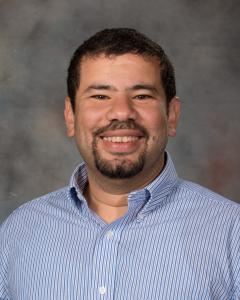Posted June 2, 2017 by Ashley Washburn
This article is the second piece in a three-part Q&A series designed to raise awareness of how trips to Washington, D.C., to meet with program officers can benefit faculty members. In the May edition of Research News, University of Nebraska-Lincoln entomologist Ana María Vélez shared how she prepared for her meetings and the advice she received. This month, Ashraf Aly Hassan discusses how his meetings helped him reshape a proposal he previously submitted to the National Science Foundation. Vélez and Aly Hassan both were part of a Nebraska contingent that traveled to D.C. in March.
Aly Hassan is a research assistant professor in civil engineering. His research focuses on emission control technologies, biological treatment of air toxics and use of innovative technology in atmospheric and indoor air pollution control.
ORED: What was the best advice you received during your meetings?
Aly Hassan: I recently submitted a proposal to NSF that was not funded. On the trip, I had the opportunity to meet with the person who oversees that program, and she explained to me the shortfalls of the proposal and how I could improve it. She was great – she told me exactly what was missing and what I could have done differently. This was a valuable conversation because she told me the scope of the program has changed, and resubmission wouldn’t be wise because my ideas are no longer a fit. I am really glad I met with her, otherwise I wouldn’t have noticed that the program changed. You couldn’t tell based on the online description. She pointed me in the direction of another program officer who oversees a program that might be a better fit.
ORED: How did the advice you received change your plans moving forward?
Aly Hassan: I learned my proposal would have to be changed significantly to fit the new scope of the program, so I’ve been looking for collaborators who might help me fulfill those objectives. I also am going to apply for a seed grant provided by the Nebraska Public Power District through the Nebraska Center for Energy Sciences Research, which is meant to help me become more competitive for external funding. Eventually, I will submit the proposal to NSF or the Department of Energy.
ORED: What would you tell other faculty who are considering making a trip?
Aly Hassan: I would definitely recommend going to figure out if you are in a good position to submit. You don’t want to waste your time and submit a proposal that won’t get funded. The conversations will help you understand the program officers’ perspective. The visits also help you build a relationship and understand what the program officers are expecting. One of the officers told me, “I can’t guarantee that your proposal will be funded, but I can tell you exactly what to do to have the best possible chance of funding.”
For more information about resources available to faculty to support sponsor engagement and proposal development, contact Tisha Mullen, director of proposal development, at 402-472-2894. Visit Faculty Travel Awards to request funds to help defray the costs of travel to visit funding agencies.







